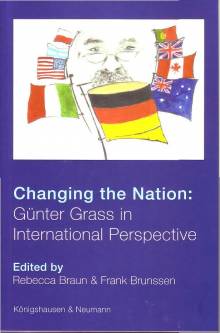|
|
|
Umschlagtext
The significance of Günter Grass's literary and political writings has all too often been discussed within the confines of a specifically German context. The essays gathered together in this volume attempt to move beyond such an interpretative paradigm by critically examining ideas of internationalism within Grass's work and by evaluating his importance as a leading German author and intellectual abroad. Established experts from Europe, North America and Australia explore the relevance of Grass's specific provenance for the development of his work, conceptualise his role as a political and cultural ambassador between Germany and the world, chart the international reception of his work and consider the impact of this reception on his Standing in Germany. In so doing, they bring a fresh perspective to Grass scholarship that consciously places the author within the context of different national and international discourses and provides new interpretations of both his literary texts and his intellectual interventions.
Rezension
Der Literaturnobelpreisträger Günter Grass gehört zu den bedeutendsten deutschen Schriftstellern des 20. Jahrhunderts. Zugleich repräsentiert seine Arbeit eine ganze Generation von Nachkriegsautoren, die letztlich Aufarbeitung, Auseinandersetzung, "Bewältigung" des deutschen Faschismus betreiben ... Ist das eine spezifisch deutsche Fragestellung? Welche Wirkung und Bedeutung hat das Werk (und die Person) von Günter Grass im weltweiten Kontext? Das ist die Fragestellung dieses durchgängig englischsprachigen Sammelbands, der auf eine Günter Grass Konferenz an der Universität von Liverpool im September 2007 zurück geht.
Thomas Bernhard, lehrerbibliothek.de Verlagsinfo
R. Braun / F. Brunssen: Einleitung – V. Neuhaus: Portrait of the Artist as a Young Nazi: The Importance of Grass‘s Provenance – M. Minden: ‘Auch die Kunst blüht nicht rein‘: Günter Grass‘s Figures of Shame – J. Preece: ‘Nach seiner inneren Geographie floß die Spree in die Rhône‘: Ein weites Feld and France – F. Brunssen: Günter Grass als internationaler Intellektueller – K. Leeder: Letzte Tänze: Günter Grass‘s Lateness – T. B. Malchow: Indispensable, Inadequate Narratives: The Evolution of Grass‘s Oeuvre in Late Modernity – K. Hall: ‘Zeugnis ablegen - im Widerspruch zur öffentlichen Geschichtsschreibung‘: Günter Grass and the Historiography of National Socialism – K. Winston: Translating Günter Grass – S. Mews: The Tin Drummer Marches On: The Post-Wende Reception of Günter Grass in the US – A. Ludewig: Vom guten Deutschen zum typischen Nazi: Günter Grass im Spiegel der Kritik in Ozeanien – P. C. Wozniak: Weiser Dawidek: Schreitet Mahlkes Doppelgänger in die polnische Wirklichkeit? – R. Braun: A Noble Winner? The Impact of International Acclaim on Grass‘s Recent Work Inhaltsverzeichnis
Introduction 9
Rebecca Braun / Frank Brunssen INTERNATIONAL PERSPECTIVES IN GRASS'S WORK 'Even the flowering of art isn't pure': Günter Grass's Figures of Shame 23 Michael Minden Indispensable, Inadequate Narratives: On Reading Grass's Oeuvre with Lacan 36 Timothy B. Malchow Günter Grass's Lateness: Reading Grass with Adorno and Said 49 Karen Leeder Memory, Myth and the Migrant Experience in W. G. Sebald's Austerlitz, Günter Grass's The Tin Drum, and Salman Rushdie's Midnight's Children 67 Peter Arnds 'According to his inner geography, the Spree flowed into the Rhone': Too Far Afield and France 81 Julian Preece 'Speak Out!' Günter Grass as an International Intellectual 94 Frank Brunssen INTERNATIONAL PERSPECTIVES ON GRASS'S WORK Günter Grass and Pawel Huelle: Pilenz and Mahlke in Post-War Poland 119 Pawel C. Wozniak Men Without a Country: Kurt Vonnegut's Readings of Günter Grass 132 Sascha Seiler Günter Grass's 'Danzig Quintet', Alltagsgeschichte, and the Historiography of National Socialism 141 Katharina Hall Peeling the Onion by Günter Grass: From Survivor Memory to Postmemory, and the Issue of a Responsible European Culture of Memory 156 Helena Goncalves da Silva The Tin Drummer Marches on: The Post-Wende Reception of Günter Grass in the United States 170 Siegfried Mews From 'Good German' to 'Typical Nazi': The Reception of Günter Grass in Australia and New Zealand 184 Alexandra Ludewig Günter Grass as a World Author 194 Rebecca Braun Contributors 210 Index 213 Weitere Titel aus der Reihe Epistemata Literaturwissenschaft |

 Bei Amazon kaufen
Bei Amazon kaufen